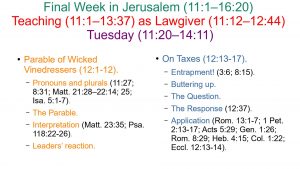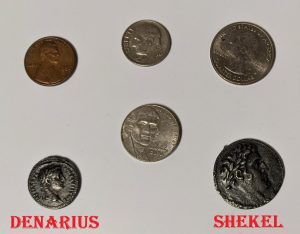Jesus’ Final Week in Jerusalem
Mark 11:1–16:20
Teaching (11:1–13:37)
King (11:1-11)
Sunday: Triumphal Entry (11:1-11).
Lawgiver (11:12–12:44)
Monday (11:12-19).
Tuesday (11:20–14:11).
Lesson from Fig Tree (11:20-26).
Jesus’ Authority Questioned (11:27-33).
On Taxes (12:13-17).
Entrapment!
Out of fear, envy, and wounded pride, the leaders are beginning to hatch their plot—questioning Him on controversial things.
They first send two strange bedfellows, the Pharisees and the Herodians, to ask Jesus a sensitive question.
If you want to enrage anybody, just ask them a religious question. Failing that, ask them a political one.
Here the Pharisees and Herodians ask Him a political one, while the Sadducees will ask Him a religious one later.
There have been many times where the leaders and elites have been dishonest in asking Him questions, and this is no different.
 Recall, it was these two groups, the Pharisees and Herodians, who were beginning to plot Jesus’ destruction all the way back in 3:6, so it likely didn’t take much to convince them to play along.
Recall, it was these two groups, the Pharisees and Herodians, who were beginning to plot Jesus’ destruction all the way back in 3:6, so it likely didn’t take much to convince them to play along.Jesus even warns of these two groups in 8:15. And here they are, proving the need for Jesus’ warning.
They actually ask a brilliant question, one to which there is no satisfactory answer—assuming Jesus stuck with the yes/no answer that was demanded.
Even in the face of such a devastating question, Jesus’ answer was even more brilliant—let’s dig in!
Buttering up.
First, these people come up and just try to butter Jesus up.
They compliment Him and flatter Him before asking their “gotcha” question.
They say that He’s true, that He cares about no one, that He shows no partiality, and that He teaches truth.
Of course, they believe none of it, and Jesus wisely takes note of their hypocrisy and even calls them on it, “Why do you test Me?”
When they say that Jesus cares about no one, this is true, but the meaning doesn’t translate well into English.
Of course, Jesus cares for and loves everyone—He was willing to die on the cross for all of us, after all!
What they mean is that He doesn’t care what they think, showing no fear in teaching God’s truth.
His flipping tables display from the day before proves that.
The question.
So here we are, Jesus’ being asked whether or not they should pay their taxes.
As I said, political issues tend to evoke strong emotion, even back then, especially among the Jews. Add onto that the issue of money and taxes!
Recall the allegiances of the two parties that are asking Jesus about this, the Pharisees and the Herodians.
The Pharisees are nationalistic and anti-Roman; the Herodians are pro-Rome because they put the Herods in power as kings and tetrarchs in Palestine.
The people tended to favor the Pharisees’ position here, hating Roman occupation and paying anything to Caesar.
These taxes were high, oppressive, and was great opportunity for corruption among the tax collectors.
This question was designed to get the attention of the Roman authorities (if He answered “no”) or to turn the hearts of the people against Him (if “yes”).
Either way, He was that much closer to being destroyed, as these leaders calculated.
Jesus didn’t fall for the trap with an absolutely brilliant response.
After calling them out for their trying to trap Him, He asks for them to bring them a denarius.
A denarius was a common Roman currency denomination. It was worth about a day’s wages.
Since no one had any Roman currency on them in the temple, they had to go elsewhere to find some.
They could have easily gone to the table of the moneychangers in the corner of the temple complex and picked one up, but Jesus’ actions the day before may have actually stuck.
So they would have likely had to go outside the temple complex to find one, pausing the Q&A until it was brought before Jesus.
He asks them about the image and inscription.
Recall, Jesus’ ministry took place during the reign of Emperor Tiberius Caesar (Luke 3:1) who reigned until a.d. 37, a few years after these events.
So the coin bore the image of Tiberius, with the inscription: “Tiberius Caesar Augustus, Son of the Divine Augustus” – abbreviated since it is such a small coin.
Then He utters the famous line: “Render to Caesar the things that are Caesar’s, and to God the things that are God’s.”
With this answer, He basically answers yes, but in such a way that angers or upsets no one—except for the rulers who were frustrated that their plan failed.
We do find that they marveled at such an adept answer, while later we read that “the common people heard Him gladly” (12:37).
Application.
Is the application here simply that we should pay our taxes? What else can we learn here?
We are to obey the laws of the land (Rom. 13:1-7; 1 Pet. 2:13-17) where they do not interfere with the commands of God (Acts 5:29).
The coins “have their name on it,” so to speak, so if they should ask for some of it back, give it to them.
We are in election season (or maybe it just ended).
Maybe you’re happy about the results, maybe not.
Does that mean we should fight each other about it?
Instead, why don’t we work together to make this world a better place?
This is best done by sharing the gospel of Jesus Christ with others, converting them into His glorious kingdom.
That’s what it means to render “to God the things that are God’s.”
While the coins bear the emperor’s image, or in our case a president’s image (or other founding father), what image do we bear?
Aren’t we image-bearers of God? (Gen. 1:26). Aren’t we supposed to be “conformed to the image of His Son”? (Rom. 8:29).
So all mankind bears the image of God, and we should give it all, and conform ourselves to the image of His Son, the Man without sin, to be holy and blameless (Heb. 4:15; Col. 1:22).
After all, this is man’s all, is it not? (Eccl. 12:13-14).
This is something far beyond the understanding of the Jewish leaders at this time, so they decide to shift gears into a religious dispute.


